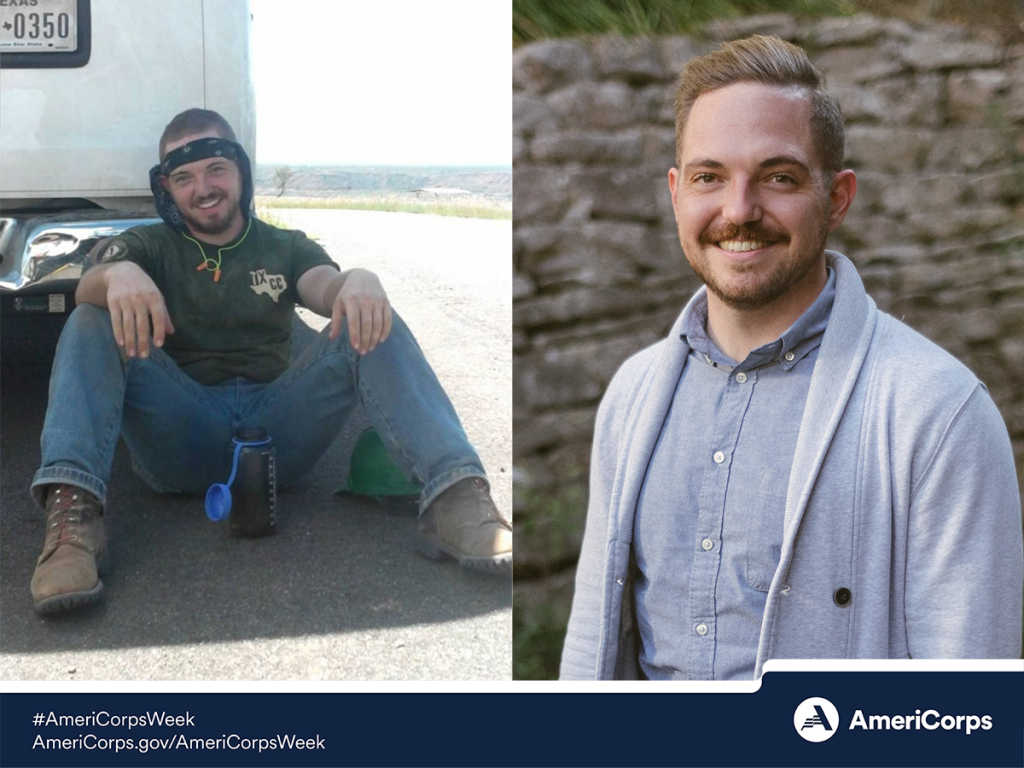Taylor Wolter served two terms as an AmeriCorps member with the Texas Conservation Corps at American Youthworks. Following his service, he took over the program in 2015 and continued to engage in numerous disasters, scaling the Disaster Response Program into a key asset for disasters in Texas and around the country.
Taylor came on board with OneStar in 2017, just days after Hurricane Harvey made landfall in Texas, and led the State of Texas in a forward direction as the Federal Taskforce Lead for Volunteer and Donations Management. Taylor is now the manager of OneStar’s Disaster Resilience initiative and is the lead for the state’s national service programs in times of disaster.
What made you decide to join AmeriCorps?
I was 25 years old working in the private sector when I had a moment of clarity. I realized that I was working a job that had no connection to my sense of service and wanted to help those who are underserved or unable to help themselves. My younger sibling had already done a term with AmeriCorps NCCC and loved it, so I made a split-second decision, sold everything I owned, and joined the Texas Conservation Corps as an AmeriCorps member, focusing on environmental conservation and disaster response. Little did I know that the decision to serve would send my life in an entirely new and meaningful direction.
How did AmeriCorps affect your perspective on service and your community? What insights did you gain about your community through AmeriCorps?
Prior to joining AmeriCorps, I thought volunteering was a noble thing that some people did, but I personally had no idea what to do or how to get involved. After learning about AmeriCorps, I was all in! During my service, I had the opportunity to live and work in communities across Texas and the United States, where I was exposed to folks from a wide range of backgrounds, belief systems, and world views. This was the first time I experienced systemic generational poverty, racial prejudice, and inequities in the federal support systems for those in need. As a result of my AmeriCorps service, I have a far more empathetic and well-rounded view of those who are challenged due to circumstances out of their control. These experiences left a forever impression, leading me to build a career in the social impact sector, where I am fortunate to continue to support those in need through my work each day.
Do you have a notable memory from your time in AmeriCorps that illustrates the impact service has had on you?
As an AmeriCorps member I spent several years deployed to natural disasters across the United States and its territories worldwide. I remember being deployed to the San Marcos/Wimberly Floods of 2015, which was only my second disaster deployment ever. I quickly got the hang of disaster work, and my superiors in the community took note. As the impacts from the disaster (an 80-foot wall of water resulting in widespread flooding) continued to grow in scale, so did our operation. On day 27 of the deployment, I was asked by the Emergency Management Director to oversee all operations in the City of San Marcos for 24 hours to allow for his team to rest and visit with their families.
This was a hugely impactful moment as I realized in an instant that my efforts and ideas as an AmeriCorps member were not only embraced, but also were recognized at the highest levels of my field, resulting in me being identified as the stand in incident commander when the government officials needed a break. For a guy who didn’t know how to connect to volunteer opportunities two years before, it felt incredible to know that I had made a tangible impact that was being recognized by professionals in my field.
What skills or experiences did you gain during your AmeriCorps service that you use in your current career?
Coming out of the private sector, I honestly wasn’t sure what experiences or skills that I would gain through my service with AmeriCorps. I quickly discovered though that it was up to me to seek out the skills and experiences I had an interest in. For me, this meant becoming the go-to member for all disaster deployments that my program was involved with. By voluntarily deploying to more than 15 disasters while in service, I developed a superior set of skills around planning large-scale disaster responses, managing large amounts of disaster volunteers (at times more than 2000 a day), and developing coalitions of individuals and organizations from a diverse set of background, world views, and political beliefs to work toward a common goal of recovering from the event.
Following my service, I was hired to run the disaster program that I served with and eventually was hired by OneStar in the early days of Hurricane Harvey to lead FEMA’s Volunteer and Donations Taskforces and oversee the largest disaster deployment in AmeriCorps’s history at that time. And it all started with the choice to do a year of service and see where it went.
What advice would you give to AmeriCorps members to make the most of their service experience?
Go all in! Take advantage of every opportunity that is presented to you to learn about nontraditional jobs and paths to success from professionals in positions you can see yourself in. Realize that unlike some traditional jobs, your AmeriCorps service is supported by professionals that want to see you grow into the best version of yourself. I always encourage anyone joining AmeriCorps to make the experience work for you. This means seeking additional opportunities to engage with work you are passionate about, exploring new career fields, and asking to be involved in initiatives and programs that are important to you as an individual. By doing all these things, you just might find a new path that you didn’t know you were looking for—I sure did.

